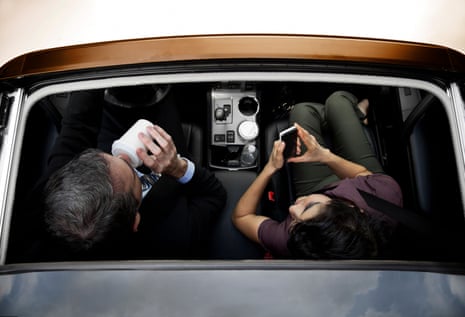Louise Stephen used to be one of the millions of commuters in the UK spending hours every day bored and alone in the car. For the past few years the biologist has driven daily from Edinburgh to the outskirts of Glasgow, where she works at a cancer research institute.
“I was stuck in traffic on the motorway one day, looking at all the other drivers sitting without passengers,” says the 31-year-old. “And I thought, ‘This is ridiculous – there must be a better way of doing this’.
“I was thinking about the environmental impact of so many empty cars, but I was also thinking how mind-numbingly bored I was. So I thought it would be good to start sharing the journey with someone else.”
Stephen contacted Cara Jardine, a fellow Edinburgh-to-Glasgow commuter, using Liftshare, the UK’s largest carpooling network, which runs a website and app connecting drivers and passengers. The pair now share petrol costs and spend the hour-long journey in Stephen’s car talking about politics, favourite podcasts and tips for running half-marathons.
“We’ve become good friends,” says Jardine, 33. She reckons she saves at least £2,500 a year by carpooling, compared with her main alternative – the train. “The train is just so busy and expensive, so this is a better option for me. It’s pleasant and fun.”
As well as helping commuters save money, carpooling advocates argue it could play a big role in alleviating some of the country’s transport pressures and easing air pollution from roads.
“The potential for this is huge,” says Ali Clabburn, founder and CEO of Liftshare. “Trains are full, buses are full – the transport system is struggling to cope with the numbers. But there are millions of nearly empty cars that could accommodate more people.”
A puzzling British reluctance
Figures from the Office for National Statistics (ONS) show that 15.3 million people in England and Wales drive themselves to work each day in cars and vans, while only 1.4 million go to work as passengers in those vehicles. That works out at an occupancy rate of around 1.1 person per vehicle.
So what’s stopping more commuters from sharing a ride? Is the renowned British reserve, a fear of small talk with strangers, holding people back from arranging a carpool?
BlaBlaCar, the largest online carpooling network in Europe, boasts 40 million members around the world, with 4 million people using the service each month. But last year its CEO, Nicolas Brusson, said the Paris-based company had “defocused” efforts in the UK, blaming a “puzzling” British reluctance to share a car journey with a stranger.
Clabburn dismisses the idea that Brits are too shy or socially awkward to carpool as “nonsense”. He launched his own service back in 1998 after arranging a lift from Bristol to Norwich on a student union noticeboard. “I became good mates with the guy who gave me a lift and I’m still good mates with him,” he says.
He concedes that carpooling is barely scratching the surface in the UK, but sees it as an issue of education. “We need to make more people aware of the option and let them know it’s easy to find people they have something in common with,” he says.
“For some people sitting together in silence is totally fine, or playing the radio is fine, or letting other people have a snooze is fine,” adds Clabburn. “But many people who give lift sharing a go find it’s interesting to have a chat and get to know people.”
Someone to whinge with
Although it is starting from a low baseline, enthusiasm for ride-sharing is growing, says Clabburn, citing Peter Kay’s sitcom Car Share and James Corden’s Carpool Karaoke as factors driving interest. Liftshare, which is run as a not-for-profit social enterprise, now has more than 500,000 active members in the UK and facilitates over one million shared journeys each month.
Uber, which offers discounted shared journeys for users in London through UberPool, is also upbeat about the approach. Although some people have complained that picking up multiple passengers is too much hassle, Uber says around 400,000 people have used the service at least once in the past three months and that it plans to expand it to other British cities.
“Car sharing is not only great for people’s wallets, it’s also good for tackling congestion and emissions,” says Jo Bertram, regional general manager for Uber in the UK. “We want to get more people into fewer cars and persuade more people to ditch their own vehicle.”
Yet some experts think that if we’re serious about ditching cars, more than persuasion will be needed: transport policy will have to stop privileging motorists.
“Carpooling won’t make a significant difference to reducing car use on its own,” says Steve Melia, senior lecturer in transport and planning at UWE Bristol. “It’s possible to reduce car use, but sticks rather than carrots make the biggest difference - measures on fuel tax, the amount of road building, planning decisions about parking.
“If you’re prepared to make it more difficult to travel by car, people have a right to expect good alternatives, whether through better public transport, or easier ways to walk or cycle.”
Regardless of the transport method they use, almost a quarter of British commuters find travelling to work stressful, according to a recent survey. One of the best arguments for carpooling may be that it gives people the chance to share some of the strain, rather than suffering in silence.
“We do tend to whinge about the government and stuff going on in the news quite a lot,” says Edinburgh carpool driver Stephen. “But it’s nice to have someone to have a whinge with.”
Sign up to be a Guardian Sustainable Business member and get more stories like this direct to your inbox every week. You can also follow us on Twitter.

Comments (…)
Sign in or create your Guardian account to join the discussion